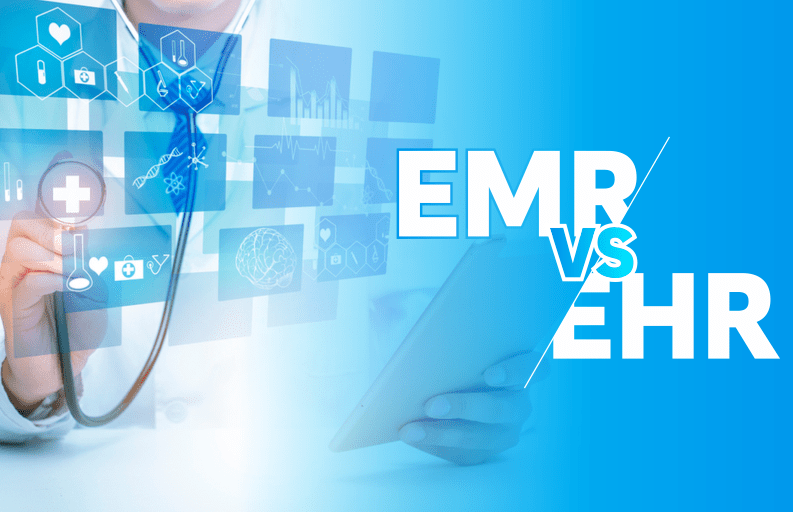In the modern healthcare landscape, navigating the world of digital records can be confusing. Often used interchangeably, Electronic Medical Records (EMRs) and Electronic Health Records (EHRs) play crucial roles in patient care, but with distinct nuances. This article delves into their world, exploring their uses, benefits, costs, and popular brands in the US market.
Understanding the Difference: EMR vs. EHR
While both store patient information electronically, key distinctions exist:
- EMRs: Primarily used by individual providers or clinics, focusing on data generated within their practice for diagnosis and treatment. Information sharing across different healthcare settings may be limited.
- EHRs: Offer a broader scope, encompassing a patient’s entire medical history from various providers and healthcare institutions. They promote information exchange, facilitating more comprehensive care coordination.
Key Benefits:
Both EMRs and EHRs bring significant advantages:
- Improved Efficiency: Digital records streamline workflows, saving time and reducing errors.
- Enhanced Care Coordination: Sharing medical data seamlessly fosters better communication and collaboration among healthcare providers, leading to more informed treatment decisions.
- Patient Engagement: Secure online portals empower patients to access their records, participate in care planning, and manage their health proactively.
- Public Health Initiatives: EHR data aids in population health studies and disease surveillance, benefiting public health initiatives.
Considering the Costs:
Implementing and maintaining EMR/EHR systems involves upfront and ongoing costs, including:
- Software licensing fees: Vary depending on features and functionalities.
- Hardware and IT infrastructure: Costs associated with computers, servers, and data security measures.
- Training and support: Ensuring staff proficiency in using the system requires training and ongoing support.
Estimated Cost Ranges:
It’s important to remember that EMR/EHR pricing varies significantly based on numerous factors, including:
- Practice size and type: Smaller practices typically pay less than large hospitals.
- Number of users: More users require additional licenses, increasing costs.
- Features and functionality: Advanced features like population health tools or robust analytics come at a premium.
- Deployment model: Cloud-based solutions often have lower upfront costs but higher ongoing subscription fees.
Here are estimated cost ranges for different practice sizes to provide a general sense:
- Small practices (1-5 physicians): $10,000 – $50,000 per year
- Medium practices (6-20 physicians): $50,000 – $200,000 per year
- Large practices/hospitals (20+ physicians): $200,000 – $1 million+ per year
Remember: These are just estimates, and the actual costs can vary considerably. Always contact vendors directly for accurate pricing quotes tailored to your specific needs.
Exploring the US Market:
Several prominent brands dominate the US EMR/EHR market:
- Epic EHR: A comprehensive system used by large healthcare organizations, known for its robust features and interoperability.
- Cerner EHR: Another widely adopted solution offering diverse functionalities across various care settings.
- Meditech EHR: Popular among hospitals and academic medical centres, with a focus on clinical documentation and analytics.
- eClinicalWorks EHR: A cloud-based solution offering affordability and ease of use for smaller practices.
- Athenahealth EHR: Another cloud-based option targeting independent practices, emphasizing patient engagement tools.
External Resources:
- Office of the National Coordinator for Health Information Technology (ONC): https://www.healthit.gov/
- HIMSS Analytics: https://www.himss.org/resources-analytics
- Healthcare Information and Management Systems Society (HIMSS): https://www.himss.org/
Additional Notes:
- Clinical decision support systems (CDSS): Integrated within some EMR/EHRs, CDSS provide evidence-based recommendations to clinicians at the point of care, potentially improving diagnosis and treatment decisions.
- Patient-centered medical homes (PCMHs): Emphasize patient engagement and coordinated care. EMR/EHRs play a vital role in facilitating information exchange and care coordination within PCMHs.
Remember, choosing the right EMR/EHR system requires careful consideration of your specific needs, budget, and desired functionalities. Consult with healthcare IT professionals and conduct thorough research before making a decision.
Videos:
EMR and EHR FAQ’s: Your Questions Answered
What is the difference between an EMR and an EHR?
An Electronic Medical Record (EMR) focuses on data generated within a single practice setting, like a doctor’s office or clinic. It primarily supports diagnosis and treatment within that specific care environment.
An Electronic Health Record (EHR) offers a broader view, encompassing a patient’s entire medical history across various providers and healthcare institutions. It facilitates information exchange, enabling more comprehensive care coordination.
What are the benefits of using EMR/EHRs?
- Improved efficiency: Streamlined workflows save time and reduce errors.
- Enhanced care coordination: Shared data fosters better communication and collaboration among providers, leading to more informed treatment decisions.
- Patient engagement: Secure online portals empower patients to access their records, participate in care planning, and manage their health proactively.
- Public health initiatives: EHR data aids in population health studies and disease surveillance, benefiting public health programs.
What are the costs associated with EMR/EHRs?
- Software licensing fees: Costs vary depending on features and functionalities.
- Hardware and IT infrastructure: Costs associated with computers, servers, and data security measures.
- Training and support: Ensuring staff proficiency requires training and ongoing support.
What are some popular EMR/EHR brands in the US?
- Epic EHR
- Cerner EHR
- Meditech EHR
- eClinicalWorks EHR
- Athenahealth EHR
Are there resources to learn more about EMR/EHRs?
Yes! Here are some valuable resources:
- Office of the National Coordinator for Health Information Technology (ONC): https://www.healthit.gov/: https://www.healthit.gov/
- HIMSS Analytics: https://www.himss.org/resources-analytics: https://www.himss.org/resources-analytics
- Healthcare Information and Management Systems Society (HIMSS): https://www.himss.org/: https://www.himss.org/
What is the role of clinical decision support systems (CDSS) in EMR/EHRs?
Some EMR/EHRs integrate CDSS, which provides evidence-based recommendations to clinicians at the point of care, potentially improving diagnosis and treatment decisions.
How do EMR/EHRs support patient-centred medical homes (PCMHs)?
EMR/EHRs play a vital role in PCMHs by facilitating information exchange and care coordination, aligning with the emphasis on patient engagement and collaborative care.



1 thought on “EMR and EHR: Key Uses, Benefits, Costs, and Top Brands”